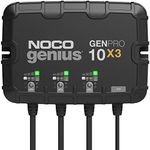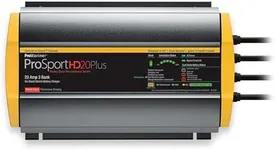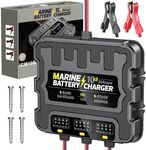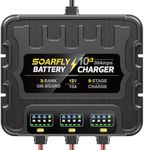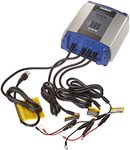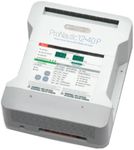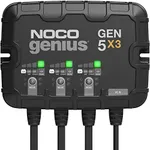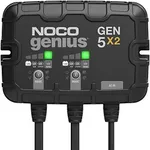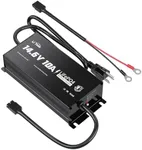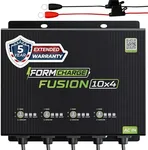Buying Guide for the Best 3 Bank Marine Battery Chargers
Choosing the right 3-bank marine battery charger is crucial for ensuring the longevity and performance of your boat's batteries. A 3-bank charger is designed to charge and maintain three separate batteries simultaneously, which is ideal for boats with multiple battery systems. When selecting a charger, it's important to consider several key specifications to ensure it meets your needs and provides reliable performance. Understanding these specifications will help you make an informed decision and keep your marine batteries in optimal condition.Charging AmperageCharging amperage refers to the amount of current the charger delivers to the batteries. This spec is important because it determines how quickly the batteries will be charged. Chargers typically range from 5 to 30 amps per bank. Lower amperage chargers (5-10 amps) are suitable for smaller batteries or if you have more time to charge. Medium amperage chargers (10-20 amps) are a good balance for most boaters, providing a reasonable charging time without overloading the batteries. Higher amperage chargers (20-30 amps) are ideal for larger batteries or when you need to charge quickly. Choose the amperage based on your battery size and how quickly you need them charged.
Battery CompatibilityBattery compatibility indicates the types of batteries the charger can handle, such as lead-acid, AGM, gel, or lithium-ion. This spec is crucial because using an incompatible charger can damage your batteries. Most modern chargers are compatible with multiple battery types, but it's important to check. If you have a specific type of battery, ensure the charger supports it. For mixed battery types, look for a charger with selectable modes or automatic detection. Choose a charger that matches your battery type to ensure safe and efficient charging.
Waterproof RatingThe waterproof rating indicates how well the charger can withstand exposure to water and moisture, which is essential for marine environments. This spec is important because it ensures the charger can handle the harsh conditions on a boat. Ratings are usually given in IP (Ingress Protection) codes, such as IP65 or IP68. A higher rating means better protection. For marine use, look for a charger with at least an IP65 rating, which means it's protected against water jets. If your charger will be exposed to heavy splashing or submersion, consider an IP68 rating. Choose a waterproof rating based on the level of exposure your charger will face.
Smart Charging TechnologySmart charging technology refers to the charger's ability to monitor and adjust the charging process to optimize battery health and performance. This spec is important because it prevents overcharging, undercharging, and extends battery life. Features may include multi-stage charging, temperature compensation, and automatic shut-off. Multi-stage charging adjusts the current and voltage throughout the charging process, while temperature compensation adjusts for temperature changes. Automatic shut-off stops charging when the battery is full. Choose a charger with smart technology if you want to maximize battery life and ensure safe charging.
Size and PortabilitySize and portability refer to the physical dimensions and weight of the charger. This spec is important because it affects where and how you can install or store the charger on your boat. Smaller, lighter chargers are easier to handle and install in tight spaces, but may have lower amperage. Larger chargers may offer higher amperage but require more space. Consider where you will mount the charger and how much space you have available. Choose a size that fits your installation area and meets your charging needs without being cumbersome.
